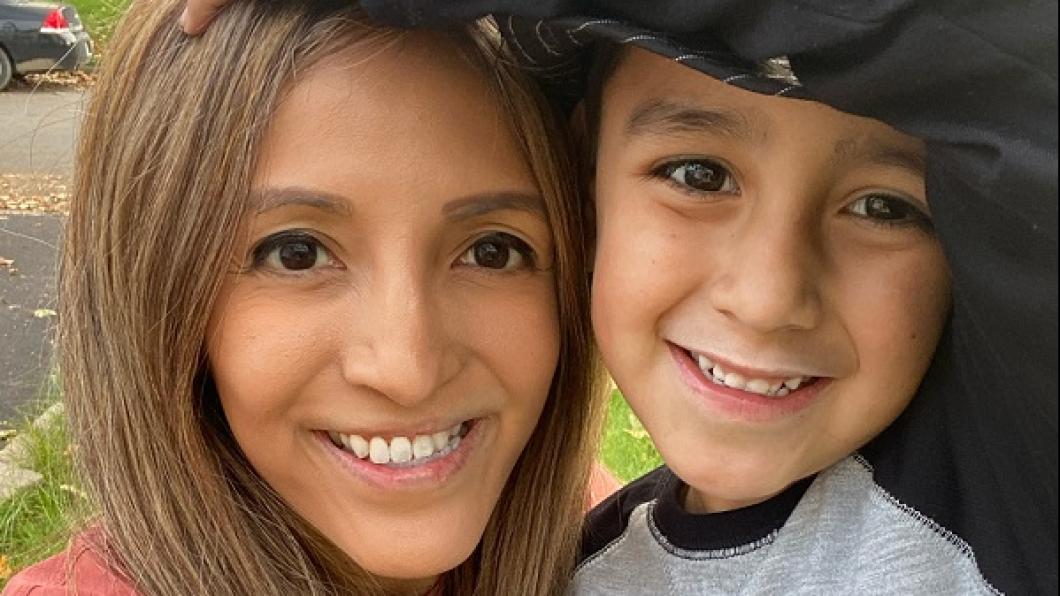
A unique new resource at Holland Bloorview aims to bring education, awareness and understanding to the complex nature of feeding challenges in autistic children.
Three-quarters of autistic children have such challenges, which can be a chronic source of stress and worry for families. ASD Feed-Ed, an online tool co-developed by researchers and families, helps parents and caregivers recognize the specific factors causing these issues, implement new strategies, and better advocate for support with their doctors. (Note: Many autistic self-advocates prefer to use identity-first language rather than people-first language in describing themselves. With this in mind, we are consciously choosing identity-first language for the purpose of describing and reporting on this study and project).
“We cover a variety of topics related to feeding and answer questions that we frequently hear from caregivers and families,” says Rebecca Perlin, a speech-language pathologist who helped produce ASD Feed-Ed. “It’s a trusted source of up-to-date information based on research and vetted by clinicians.”
Feeding challenges can cause serious issues for children and their families, ranging from nutritional deficiencies, constipation and obesity to behaviour concerns, parental stress, and even isolation.
“It’s concerning not just from a nutrition standpoint but from a social one too, because food is so central to our ability to interact with others,” says Dr. Sharon Smile, clinical study investigator at Holland Bloorview. “Then, when parents are unable to help, they feel deep levels of stress and guilt.”
Maritza Basaran is a family leader at Holland Bloorview whose young son Harrison has ASD-related feeding challenges. She says her family felt stuck for many years not knowing how to help him.
“Meal times were so stressful for our whole family, with constant worry about my son not getting the nutrition he needed,” she said.
Maritza and Harrison are frequent collaborators to Holland Bloorview research and joined one important project that helped spark the new resource.
‘Learning to eat at home”: a collaborative study
ASD Feed-Ed has its origins in Project LeAH (“Learning to Eat At Home”), a Bloorview Research Institute (BRI) study that tested a multidisciplinary telehealth approach with 15 preschoolers with ASD and their families.
The team, led by Dr. Smile, sought to understand the precipitating factors and what evidence-driven interventions would be most helpful for families. They performed weekly virtual visits with families for up to 12 weeks.
“This was key because we were able to see exactly what was happening and could support parents right in their homes as opposed to seeing them in our clinic,” says Dr. Smile. “Parents are the drivers of change, and their involvement in this research is paramount.”
The team found effective techniques to overcome several identified feeding challenges including establishing mealtime routines, giving rewards for desired behaviours, practising new skills, and personalizing the meal time environment for each child.
Maritza says her family became more confident at the dinner table, gained a new understanding of the issues to focus on, and ultimately felt less alone. “Quite honestly, the experience improved our relationships and made the whole family less stressed and anxious,” she says.
Accessible access to care
The new ASD Feed-Ed resource empowers parents and caregivers with practical information curated by multidisciplinary experts – all with accessibility in mind.
Dr. Smile says that if parents don’t understand the language or technical terms, it can leave them feeling alone in navigating a path forward. As a result, ASD Feed-Ed uses written and visual information to ensure all families can access the strategies and support they need to better advocate for their child.
“Even if you can’t read what’s written, you can watch a video and pick up different clues for how to support your child’s unique needs,” says Dr. Smile. “Applying an EDI lens was important to ensure that we create a platform that served a diverse population.””
Occupational therapist Christie Raffaele, who helped develop the resource, says the goal is for any parent to better understand the different factors underlying feeding challenges, and then recognize which may be impacting their own child. “This means, instead of talking with their doctor about their child having trouble eating, they can hone in on a specific issue and develop a plan to manage it,” she says.
For Maritza, she’s learned invaluable techniques to understand Harrison’s challenges and better communicate with his physician.
“The resource is a big help in framing for others the reality of the situation,” says Maritza. “Being able to say to your doctor: ‘this is what my mealtime looks like. I know there are certain sensory issues, but I’ve also noticed that he drools and isn’t swallowing saliva.’ These nuances are vital in taking a deeper look at the issues involved, and creating strategies that work.”

An empty lunchbox = success
Maritza’s family are now on a positive path forward, having unlocked simple yet powerful techniques to improve mealtimes.
“We had relied on an iPad for him to stay at the table, but as a result he ignored his food,” says Maritza. “So we put the device away and worked on strategies for him to sit and focus on his plate. Even having someone tell us it’s okay if he eats for just 10 minutes has made a big difference.”
Maritza has also used new techniques outside the home, talking and working through known triggers with Harrison to prevent stressful reactions in different settings. In fact, a photo from Harrison’s daycare is perhaps all the proof needed of how far they’ve come: his empty lunchbox – a new success.
ASD Feed-Ed takes aim at the 8 main areas of focus around feeding challenges:
- Medical – e.g. constipation, acid reflux, food allergies
- Oral-motor – e.g. chewing or swallowing issues, dental cavities
- Behaviour – e.g. tantrums, screaming, throwing food
- Skills – e.g. using utensils
- Sensory – e.g. unique preferences on smell, taste, texture
- Environment – e.g. impact of dining area at home
- Nutrition – e.g. getting insufficient vitamins and minerals
- Parent-child interactions – e.g. anxiety over approaching mealtime, communications challenges